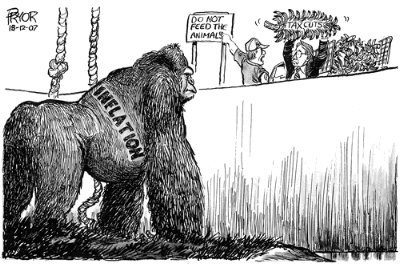|
December 20, 2007
One of the centre pieces of the ALP's election campaign was a tax package that will add a lot more to demand than they do to the supply of labour. And the Reserve Bank lets it be known that it would have put up interest rates again in December if it were not for the credit crunch in international financial markets. Treasury is talking in terms of the likelihood of further pressure on the underlying inflation rate over the next 18 months given the economy's lack of spare capacity.

Pryor
Access Economics says delivering on the tax commitments will push up interest rates unless there are extra spending cuts. It says adding another tax cut to an economy already at full stretch does not boost the size of the economy and create more jobs. Instead it brings a bigger import bill and higher prices. So more spending cuts are required.
This kind of response needs to be put into the context of what is f happening in international financial markets. Does not the credit crunch crisis there represent the first crisis of financial globalization? The clogg up in the international money markets increasingly appears to be the most severe financial turmoil hitting advanced economies in the last twenty years. Nouriel Roubini says that we should be wary of the international central bankers as their understanding of this crisis has a history of being flawed:
...the central banks – the Fed in particular – have been behind the curve for over a year now. The Fed totally underestimated the housing recession arguing – like most market folks – that this was a temporary slump that would bottom out by the end of 2006 (sic!); it kept on saying throughout the winter of 2006 that the sub-prime problem was a niche and contained problem when it was not just sub-prime mortgages but also near prime and prime and excessive and reckless lending and leverage across the entire financial system; it kept on arguing that the housing slump would not affect other sectors and would not lead to a more severe economic slowdown that is in full swing now; it underestimated the risk of broader contagion to the financial system and ended up being literally surprised when the liquidity and credit crunch hit in the summer time; it then it deluded itself in believing that this crunch was temporary and that Fed easing would resolve it; and it was then surprised (as Kohn admitted in its last speech) when the crunch got worse rather than better in the fall and has now gotten much worse than in August. So, the Fed has been persistently wrong for over a year now in its assessment of the economy and of financial markets.
The housing downturn in the US is entering its third year and the Federal Reserve's actions to contain the fallout have largely ineffective. The hard landing that the US is now experiencing and a severe global economic slowdown are the consequences for the credit excesses, the asset bubbles, the reckless leverage, the lack of minimal appropriate supervision and regulation of financial markets of the last few years. The central bankers are saying very little about the medium terms issues of reforming the architecture and governance of the international financial system.
|
